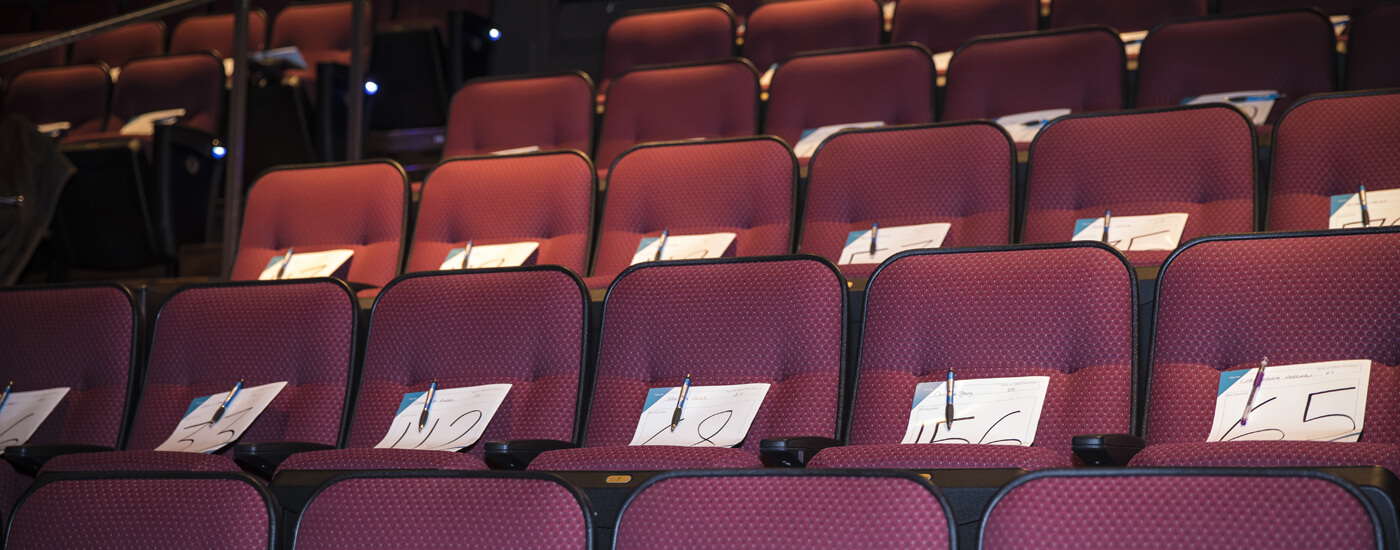08 Oct Interview with LIONS playwright Jihan Crowther
We asked Jihan Crowther about writing for television, the stage, Lions, and the Rough Reading Series. Read on to learn about the playwright behind our first Rough Reading!
You write for Man in the High Castle and the upcoming Barry Jenkins adaptation of The Underground Railroad, in addition to writing plays. How does writing for TV differ from writing for the stage? Do they feed into each other?
I think the main difference is you write for TV with a committee, so it’s much more collaborative with other writers. You’re figuring things out together, which is great, because writing for the stage it’s usually just you, unless you have a writing partner, and all of the plot points of the play are up to you to figure out.
A really good example is yesterday, there was something with my episode where I was like “I don’t know, what is it?” and somebody else was like “oh! what if it’s this?” and I was like “Oh my god, you’re a genius!”. It was such a relief to not have to depend only on my own ideas. You’re dealing with a TV show, which is so huge—particularly, the TV shows that I write on, Man in the High Castle goes to alternate worlds and there’s different people, different coasts, different parts of the world—it’s so nice to have 8 other writers who have those worlds in their head at the same time, to come up with ways to make the worlds better, make the stories better. It’s not all up to you, you feel like a team, which is great because writing is otherwise so solitary. And I do really appreciate the solitariness of writing, because I’m naturally a bit shy—but it’s good to have colleagues. It feels like a team project. It’s so funny, I was talking to one of my friends in the office last night and we were saying—because our new season just dropped last night—it’s so weird, we were like “oh, you guys are watching our school project?” That’s how it feels when we’re writing it, and then it’s like “oh everybody in the world can see it”.
I like them both separately for different reasons. What’s really great about what’s happening in TV now is a renewed focus on character-based story. You see all these small, intimate dramas, really finely drawn comedies, like Atlanta, Insecure, and it’s just really a very exciting time right now to be writing for TV. For me, plays have always been character first. What’s interesting about stories is what’s happening with the characters. I think that’s how one influences the other—one of the reasons I think I was hired to work on High Castle was because they were looking for some character-first work because, as you can imagine, it’s very plot heavy. It’s really nice to come in and bring those skills, you know—how is she FEELING about being caught in another world?
They marry each other really well, they’re natural cousins. What you can do on the stage is anything, what you can do on TV is also anything.
What drew you towards the haunted and ghostly aspects of Lions?
I’m a really big scaredy cat, that’s the first thing to know. I’m afraid of everything. And I believe in ghosts, which, you know, made growing up in the South that much scarier, because everything is haunted.
I’m really interested in the ways in which we are shaped by history, how we never escape it. Even if there are things that happened in the world around us that we didn’t have a direct impact on, we are still affected by it. I think a ghost accesses the story as a way to dramatize that. It’s also a way to show the residual effects of your actions. They are always around. That’s something I am trying to say with this play.
There seems to be a new movement associating the horror genre with the black experience, looking to movies such as Get Out. How do you feel that connects to Lions?
I didn’t think about that, but it’s interesting. I did watch Get Out, and I think it’s brilliant. There is something about the haunted nature of the Black American experience that lends itself to horror and ghost stories. It’s a constant trying to find your place, constant adjustment to who you are in different time periods.
There is a deep connection to ancestors and working in a way that respects them, that gives homage to them. There is this feeling of wanting to make them proud because of all of the trauma they’ve experienced to get to this point. I think a lot about people who aren’t ancestors yet but who have been to hell and back. Think about John Lewis, Obama seeing Sessions back in office. One of my friends, her grandmother passed away right after the 2016 elections. I think after Obama, she couldn’t bare the thought of living through that again. Now, my friend feels like it’s up to her to make things better for her daughter. There is a strong sense of carrying history with you.
Being a first-generation American, you likely experienced a lot of differences between the culture you grew up in and the culture your parents grew up in. How does being a first-generation American influence your writing both on LIONS and in other works?
My mom’s from Liberia and my dad’s from Sierra Leone, but they are both descended from American slave people, so there’s this toggling back and forth between Africa and the U.S. that my family has been doing for about 200 years. I find that to be really fascinating, especially my mother because Liberia was land that was “given” to free American slaves. My mom had very American cultural touch tones—her favorite show growing up was I Love Lucy, she knows how to make American soul food, these were all things that were brought back with her ancestor who escaped enslavement, so it was interesting to have that piece. But it also had its entirely own culture.
So growing up in a very West African household with our meals and expectations and cultural things, but then also having to be American in a country which is not great if you are a black kid, it was weird. My parents fully understood American racism and part of the reason I was born in the U.S. was because my parents were in school there and they had always planned to go back, in part because they couldn’t take American racism, there’s no reason for it and it’s unacceptable. They tried to understand what it was like for us to grow up, but it was impossible. There were things that I was embarrassed about that they couldn’t understand because they didn’t experience that. I think they felt a lot of pain about that, about us being ashamed of their culture because we were taught that their culture was embarrassing or ugly.
Looking back, that must have been very hard for them, and so I think about their experiences a lot. A previous play I wrote was based on their ancestors returning to Africa after escaping enslavement. I think about those ancestors a lot, I think about my parents and their experience and what it must have been like for them to come to school here and have difficulties they didn’t expect to encounter along with just trying to go to school. I think a lot about our perspective—me and my sisters. We feel both in many ways—we will say they meaning Americans, and say we meaning Americans and we meaning Liberians. We feel all of them combined, which gives a great insider perspective and outsider perspective which is something a lot of first-generation kids have. It gives us a birds-eye view of American culture and I knew a lot more about American foreign policy growing up. I never had a candy-coated view of the States because I could see the direct cause and effect. All of that impacts the way I work, and it can’t not because I don’t have another point of view.
What are you most excited to work on and discover in the Rough Readings Series?
What I really love about readings and being able to be in the room with the audience is to discover how they are experiencing it. I’m excited to see how this plays to the audience in the Bay, if they have a similar response to what I’ve had in LA, or if it’s completely different.
I really want a chance to deep dive back into these characters, and see where I am as opposed to where they are. Everyone changes, obviously, and I feel so different as a writer from when I first started the play, and I’m intrigued to see what adjustments that brings.
I’m very excited to see what the actors bring to it. I learn so much from actors and how they approach material, just based off what they have in front of them. I’m excited to see everyone else’s interactions with it—see what it is at this stage. Fresh eyes on it is huge.



No Comments